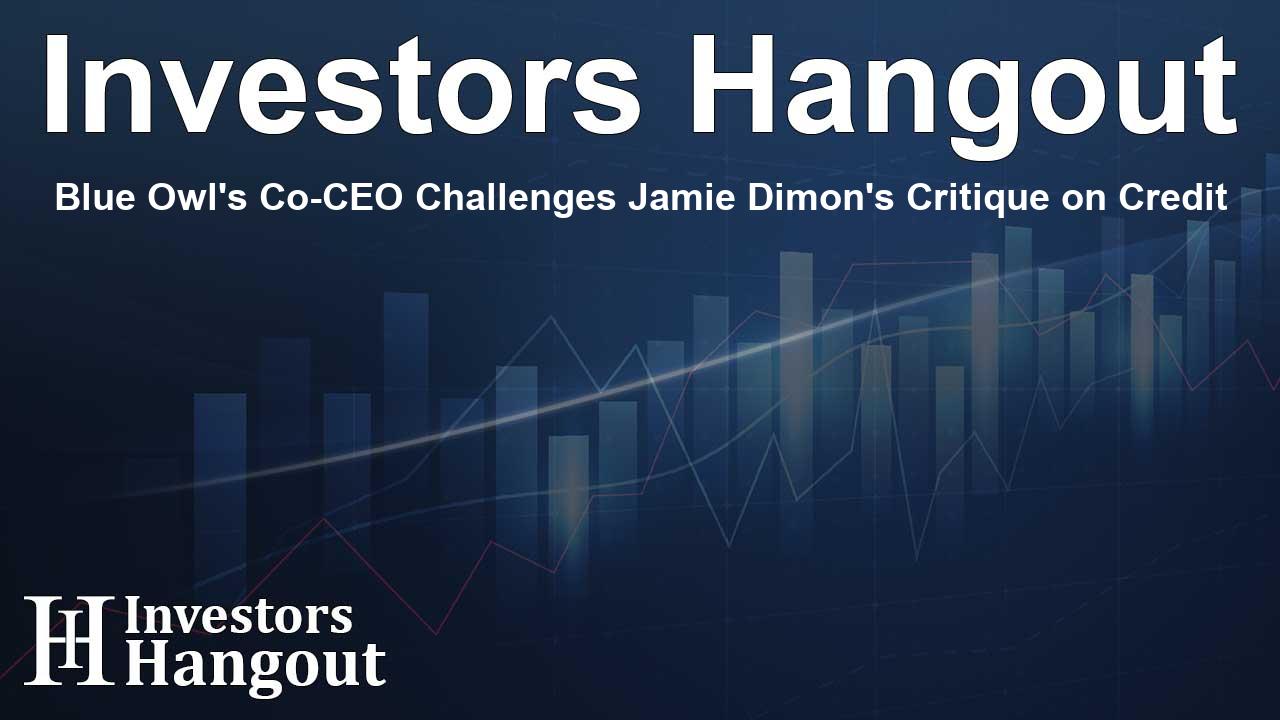Blue Owl's Co-CEO Challenges Jamie Dimon's Critique on Credit

Disputing Claims on Credit Market Health
A lively discussion has surfaced regarding the state of U.S. credit markets, as Blue Owl Capital Inc. (NYSE: OWL) co-CEO Marc Lipschultz directly responded to a warning made by JPMorgan Chase & Co. (NYSE: JPM) CEO Jamie Dimon.
Lipschultz's Rebuttal to Dimon's Concerns
After Dimon likened recent bankruptcies to spotting a "cockroach," hinting that there may be even more lurking beneath the surface, Lipschultz shot back, saying, "I guess he’s saying there might be a lot more cockroaches at JPMorgan." His comments were made during the CAIS Alternative Investment Summit, where he asserted that the failure of the multi-billion-dollar auto parts supplier, First Brands, does not signal a broader crisis within the private credit market.
Addressing Fear in the Market
Lipschultz characterized the anxiety in the market as an odd form of fearmongering, arguing that First Brands' failure was an isolated incident tied to alleged major fraud in traditional syndicated loans, which primarily involve larger banking institutions, rather than the direct lending field.
Private Credit Remains Strong
He further emphasized that the recent economic volatility ought to encourage a "flight to safety," directing investors away from syndicated bank loans toward private credit, which he described as "incredibly healthy." This assertion seeks to reassure stakeholders about the robustness of the firm's financial positioning.
Economic Insights from El-Erian
On the flip side, economist Mohamed El-Erian, the chief economic adviser for Allianz, expressed strong agreement with Dimon. In an interview, he articulated that the recent credit issues arise from a prolonged period of excessively lenient lending practices. He stated, "I agree with what Jamie Dimon said, which is, you know, cockroaches don’t come in ones and twos." El-Erian's insights suggest that many defaults in the market could become commonplace, although he doesn't see a systemic threat to the economy at large.
Impact of Recent Bankruptcies
The conversation was ignited by the failures of First Brands and subprime auto lender Tricolor Holdings, events which have intensified worries about credit quality, causing significant sell-offs among regional bank stocks. Following the bankruptcies, Zions Bancorporation NA (NASDAQ: ZION) publicly revealed a substantial charge pertaining to poor loans to some borrowers.
Market Reactions
Additions to the narrative include Western Alliance Bancorp (NYSE: WAL), which has accused a borrower of fraud. These developments have substantially impacted investor sentiment, notably reflected in the performance of the SPDR S&P Regional Banking ETF (NYSE: KRE), which fell by 6.20% in one day — its worst decline since early April. Additionally, the S&P 500 index dropped 0.63%, demonstrating broader market tremors in response to these troubling trends.
Current Market Conditions
As of the latest trading sessions, futures for the S&P 500, Dow Jones, and Nasdaq 100 indices are trending downwards, further underscoring existing investor caution in the market. In the wake of these challenges, it is crucial for companies in the financial sector, including Blue Owl Capital Inc., to keep a close eye on market indicators to navigate these turbulent waters effectively.
Frequently Asked Questions
What sparked the dispute between Blue Owl and JPMorgan?
The dispute was ignited by comments made by JPMorgan CEO Jamie Dimon, who referred to recent bankruptcies as indicative of deeper issues in the credit market, prompting a rebuttal from Blue Owl's co-CEO.
How does Blue Owl assess the health of the private credit market?
Blue Owl's co-CEO Marc Lipschultz maintains that the private credit market is strong, asserting that recent bankruptcies are not indicative of systemic problems.
What are the recent events affecting regional banks?
Bankruptcies such as that of First Brands and allegations of fraud against borrowers are contributing to faltering investor confidence in regional banks, prompting sell-offs in their stocks.
What is the stance of economist Mohamed El-Erian?
Economist Mohamed El-Erian sides with Jamie Dimon, indicating that current credit issues are worsened by a protracted phase of loose lending, leading to defaults.
How did markets react to the recent news?
Market reactions included significant declines in regional bank stock prices and the broader indices, showcasing investor unease in response to the news.
About The Author
Contact Dominic Sanders privately here. Or send an email with ATTN: Dominic Sanders as the subject to contact@investorshangout.com.
About Investors Hangout
Investors Hangout is a leading online stock forum for financial discussion and learning, offering a wide range of free tools and resources. It draws in traders of all levels, who exchange market knowledge, investigate trading tactics, and keep an eye on industry developments in real time. Featuring financial articles, stock message boards, quotes, charts, company profiles, and live news updates. Through cooperative learning and a wealth of informational resources, it helps users from novices creating their first portfolios to experts honing their techniques. Join Investors Hangout today: https://investorshangout.com/
The content of this article is based on factual, publicly available information and does not represent legal, financial, or investment advice. Investors Hangout does not offer financial advice, and the author is not a licensed financial advisor. Consult a qualified advisor before making any financial or investment decisions based on this article. This article should not be considered advice to purchase, sell, or hold any securities or other investments. If any of the material provided here is inaccurate, please contact us for corrections.
